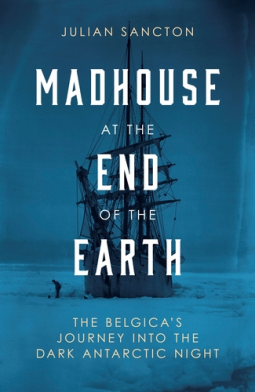
Madhouse at the End of the Earth
The Belgica’s Journey into the Dark Antarctic Night
by Julian Sancton
This title was previously available on NetGalley and is now archived.
Send NetGalley books directly to your Kindle or Kindle app
1
To read on a Kindle or Kindle app, please add kindle@netgalley.com as an approved email address to receive files in your Amazon account. Click here for step-by-step instructions.
2
Also find your Kindle email address within your Amazon account, and enter it here.
Pub Date 27 Jan 2022 | Archive Date 1 May 2022
Random House UK, Ebury Publishing | WH Allen
Talking about this book? Use #MadhouseattheEndoftheEarth #NetGalley. More hashtag tips!
Description
The Belgica set sail from Europe on a sunny day in August 1897, intent upon becoming the first scientific expedition ever to reach the South Pole. But after setbacks slowed its progress, ice closed in and ensnared the ship. Temperatures plummeted, winds howled, perpetual darkness fell.
The crew were to make history for a different reason: they were to be the first adventurers to face the brutal Antarctic winter, completely cut off from the world. What began as an audacious scientific mission morphed into an epic struggle for survival.
As the men battled blizzards, hunger, depression, rats and scurvy, some became inconsolable, some mad, while others were consumed by infections that turned them into living corpses. It was down to the strongest characters to step up: namely the wild surgeon Dr Frederik Cook and the first mate, a young Norwegian adventurer by the name of Roald Amundsen.
Could they devise a plan to break free of the ice and guide the ship back to open sea, against all odds?
Available Editions
| EDITION | Paperback |
| ISBN | 9780753553442 |
| PRICE | £9.99 (GBP) |
| PAGES | 368 |
Average rating from 103 members
Featured Reviews
An oddly enthralling account of a Belgium exploration of the Antarctic in early part of the 20th century.
Told like a novel, the adventure, planning, setbacks and outcomes grasp you from the onset.
Thanks to NetGallery, I was able to read an early copy and I enjoyed it thoroughly. A subject matter which wouldn’t necessarily appeal to me, this cleverly written account is a highly recommended read.
 Kate S, Reviewer
Kate S, Reviewer
This book was incredible! Julian Sancton manages to include meticulous research and authentic scientific and maritime details while making the book read like a ‘ripping yarn’. I am so glad that this story has finally been told in English as it wasn’t an expedition I was familiar with. Having read fairly widely about John Franklin and Erabus and Shackleton it was breathtaking to read of a ship that survived a polar winter. Despite knowing the outcome of the expedition I was still on the edge of my seat, reading feverishly to find out if they would manage to free Belgica from the ice.
De Gerlache was a tricky ‘hero’ for me, clearly an incredible seaman but so driven by pride that almost every decision he made was the wrong one. Amundsen and Cook were my heroes but it was sad to see that neither lived up to their early promise. That said, both were leagues ahead of De Gerlache and the rest of the crew in terms of their ability to innovate and adapt to the conditions they encountered. I will forever wonder what would have happened had they gone ahead with their plan to find the pole before returning to Belgium in 1900. It was fascinating to read Cook’s hypotheses about the affects of lack of sunlight on the crew and how he single handedly saved the crew from scurvy by using knowledge gained from Inuits in the Northern Polar regions.
A must read book for anyone interested in polar exploration and geographic discovery.
I was expecting Dan Simmons “The Terror”. What I got was something a little bit different.
That was fact-based fiction. So is this, but there’s much more detail, no supernatural horror, and a lot of human spirit, trial and tribulation. “Madhouse at the End of the Earth” is a fictionalised account of an actual Belgian expedition to the Antarctic, in the final years of the 19th century, and is based on a multitude of journals and reports.
I’m not a huge fan of non-fiction, but in this case, the NetGalley blurb caught my attention, as I really had enjoyed “The Terror” and I realised this was a fact-based novel. It seems the story of the Belgica has been poorly served by history, as most of it has never been translated into English, even though it’s one of the best documented, with many journals, reports and essays in existence. And it’s these that author Julian Sancton has meticulously taken apart and re-told in this thrilling tale.
The Belgica set sail from Europe in August 1897, the aim being to become the first scientific expedition ever to reach the South Pole. But as might be expected, numerous setbacks slowed its progress, the ice closed in and trapped the ship. Temperatures plummeted, and the south polar night fell.
So far, readers of “The Terror” will be up-to-speed. The crew face severe weather, hunger, depression, disease, and struggle to over-winter, trapped in the cruel cold. Several characters appear, to save the day - surgeon Dr Frederik Cook, first mate Roald Amundsen and the leader of the expedition Adrian De Gerlache. Flawed humans, every one, but incredibly well fleshed out by the author. The story fascinates, annoys, astounds and shocks all at the same time.
In the final Authors Note (fascinating in its own right) Sancton talks of Dr Cook’s hypotheses about the effects of isolation (the original magazine article that drew the authors attention to the expedition was about isolation likely to affect astronauts to Mars) and the lack of sunlight on the crew. Cook saved the crew from scurvy by using knowledge he gained from Inuits in the Northern Polar regions.
Thanks to the rich source material, this is a deeply detailed and complex story. It will obviously appeal to fans of polar exploration and early voyages of discovery, but also will grab thriller fans too. Thoroughly recommended. I enjoyed the ARC so much, I’ll probably rush out and buy the print copy.
 Margaret H, Reviewer
Margaret H, Reviewer
Madhouse at the end of the World is the story of the 1897-1899 Belgian expedition to the Antarctic region, featuring De Gerlach the Belgian responsible for conceiving the idea and obtaining funding for his voyage. We also have Fredrick Cook as ships doctor and Roald Amundson when a very young man, these two explorers would later be responsible for the conquests of the North Pole.
Although a history book this book reads like a thriller and as one reviewer has written a’ripping yarn’ which it certainly is.
As the trip begins all manner of things occur not least an almost mutiny and then when they eventually arrive in Antarctica they become trapped in the winter ice. For 24hours over the solar winter day turns to night, leading to deprivation and suffering not only physical with the effects of scurvy but also psychological where behaviour changes for the worse with the continuing darkness.
A fascinating and exciting story of endurance, with a flowing narrative and characters well described and full of depth.
If history could be taught like this in schools it would excite and engage like none other.
A brilliant read, throughly enjoyable, a complete page turner.
My thanks to net galley and publishers for the opportunity to review this book honestly.
A sensational account of the fated Belgian Antarctic Expedition.
Early chapters establish the socio-political context and the leading actors: the cool-headed, charismatic daredevil, Dr Frederick Cook; pre-South Pole conqueror, Roald Amundsen; and Commandant Adrien de Gerlache, a resourceful, glory-seeking seafarer, but no leader of men. The story really gets going once the Belgica sets sail from Antwerp in 1897. From the off, everything that could go wrong does go wrong. Ultimately, when the feisty barque is imprisoned in ice, her scurvy-ridden crew unravels with madness.
Sancton has a journalist’s eye for a good story. His meticulously researched, compelling writing engages with a combination of the human angle plus fascinating details of the inhospitable Antarctic. We hear the moans, cracks and grating of the ice, we see the dynamics of icebergs, and we meet the southernmost flowering plant in the world, Deschampsia antarctica.
A truly gripping, hair-raising adventure.
My thanks to NetGalley and Random House UK for the ARC.
The blurb of this book grabbed my attention and, even though it is not a book I would generally read, I decided I wanted to try and good thing I have.
Gripping from the first page, the amount of research and detail Julian Sancton was able to include in this book but still managing to make it incredibly interesting and a page turner is unbelievably perfect.
The book includes really captivating arguments around three main characters: Dr. Frederick Cook, Adrien de Gerlache and Roald Admundsen. This includes some background information prior to the journey to the Antarctic and following their trajectory in the expedition.
This book is simply superb and I would highly recommend it to anyone who loves non-fiction or loves anything related to the Antarctic.
 Reviewer 333367
Reviewer 333367
I was very excited to see this book as I love any stories set in the artic/antarctic. I absolutely loved this book and I'm not exaggerating when I say I couldn't put it down. It's an incredible story, and Sancton's writing is vivid and compelling. The diary extracts from the members of the expedition are woven in seamlessly too. I will definitely be recommending this book.
 Reviewer 482802
Reviewer 482802
I have started reading this story and I am about one third of the way through. So far I have found the book to be well researched, well written and enlightening. To me this is an historical account of a polar expedition which is new and untold. A book I will enjoy over a period of time rather than reading in one go.
 Amelia E, Reviewer
Amelia E, Reviewer
A gripping account of the de Gerlache Antarctic expedition of 1897-1899, in which the ship became frozen in the ice for the entire winter. It’s also the story of the friendship between the ship's doctor, Dr Frederick Albert Cook, and Roald Amundsen, who was at the beginning of his career as an explorer.
I loved this book. It has all the makings of a disaster story, and I spent the majority of it waiting for calamity to strike. Somehow, despite numerous crises, there would always be some breakthrough, only for something else to happen almost instantly. I never saw a more ill-assorted group of people: everyone seemed to have their own agenda, and some of the officers, including de Gerlache, made some very questionable decisions in order to achieve their aims. The author uses a lot of primary sources such as diaries, something I really liked because it let me get a bit into the minds of the men. Their characters were fascinating, especially Amundsen's, and it was great reading about his early adventures and his approach to polar exploration. Cook sounds like a very complex man, and I enjoyed reading about him too.
Ever since I read Buddy Levy’s Labyrinth of Ice last year I’ve been wanting to read something about Antarctic exploration, so I was especially excited to find this book. It delivered exactly what I was hoping for: an exciting, informative account that was almost impossible to put down. I really enjoyed it and definitely recommend it.
I’d like to thank the publisher and Netgalley for kindly providing me with an advance review copy. All opinions are my own.
 Reviewer 281270
Reviewer 281270
Madhouse at the end of the Earth is a historical non fiction account of the Belgica expedition to Antactica. The backstory is slow, so push through what is a boring first few chapters to get to the actual expedition. Don't skip it, as the backstory does actually set the groundwork for the personalities and their decisions that happen later.
Once the expedition gets to Antarctica the account becomes gripping and harrowing, as they get trapped on the ice and have to survive a winter in situ together - with excruciating hardship and unimaginable decisions to be made.
The men's stories are taken from journals, diaries and historical documents and really shows us an array of different personalities - their strengths and their flaws. It's full of detail, which coupled with the personal story manages to both educate and entertain.
It is written in a very engaging, vivid and immersive manner, but with meticulous research giving it an authentic historical backing. I highly recommend it to anyone interested in historical expeditions.
 Dave W, Reviewer
Dave W, Reviewer
A historical event brought to life again.
Towards the end of 1800's the polar regions still had much to discover specially the Antarctic, Belgium was still in its infancy as a country hence Aidrien De Gerlache struggled to get a full Belgium crew for his ship and exploration trip to the Antarctic. Hence they eventually left Antwerp with a crew of only 50% Belgiums and the rest from other countries mainly Norwegians including Admundsen as well as one American who was called Cook the crews doctor.
It took a while to get a full team and the whole experience was full of trials and first experiences but new discoveries always come at a cost. This is an account of the expedition written with a feel of the time but in modern English which I'm sure takes something doing a credit to Julian Sancton.
I really enjoyed this book, felt the tensions and loved the honesty which must of took some research as peoples faults were often hidden or covered up part of the sailors code as I'm told. A whaler was transformed into a polar ready ship called the Belgica and the fun and despair begin.
It's a five star read for me and hope you feel the same its also a historical account of true events which is well researched as said before. If you are a lover of history or have a interest in the Polar regions this is a must 📚 read and I hope you but only enjoy but learn a I did.
 Julie F, Reviewer
Julie F, Reviewer
August 1897 and the Belgica sets sail to try and reach the South Pole. Brilliant book that reflects the people onboard and their strengths to undergo such a voyage.
Trapped in the ice they struggle to survive. So well written I could not put it down. We get a glimpse into the lives of many now famous explorers, enjoy.
 Book B, Reviewer
Book B, Reviewer
Fascinating fictional account of what went wrong on The Belgica ,the ship and crew who sailed to the Antarctica in 1897. We learn of what it was like on board, the conditions, the fear, the sense of remoteness and hopelessness and then what happens when the crew turns in on itself. It's a locked room mystery and a study in human emotions and is as raw as it is fascinating. Very well researched and carefully constructed into a tale of human endurance and survival. recommended.
 Sian B, Reviewer
Sian B, Reviewer
I thoroughly enjoyed reading this true life story.
It is very well written and intriguing.
I could imagine myself on that ship, in the cold, dark Antarctic winter.
Definitely worth reading.
This is very well researched, fact-based fiction about the Belgian Antarctic Expedition in the late 1900s. There's a lot of detail, such as the difficulties encountered financing the trip, Dr Cook's assessment of the impact of lack of sun and freezing conditions on human health, and the crew's various attempts at freeing their ship from sea ice. The treacherous and nightmarish mission is skilfully described, as is the fate of some of the survivors in later chapters. I don't normally read this type of book but, if you are interested in polar exploration and the characters it attracts, it is a must read.
The harrowing true survival story of an early polar expedition that went terribly awry--with the ship frozen in ice and the crew trapped inside for the entire sunless, Antarctic winter--in the tradition of David Grann, Nathaniel Philbrick, and Hampton Sides.
This is a very well written account of the expedition and is very detailed. The hardships the men suffered were laid out in detail. I can't think of any aspect of the journey that wasn't discussed and told very well. This is an exceptional book. I will certainly look into other books written by Mr. Sancton.
This is a first for me by the author and one I enjoyed and would read more of their work. The book cover is eye-catching and appealing and would spark my interest if in a bookshop. Thank you very much to the author, publisher and Netgalley for this ARC.
This book is a fantastic tale of the Belgica's expedition to Antarctica in the late 1890s. Never before told in English, which is a criminal oversight, it's full of fascinating information, gory goings on and survivial against the worst odds on the planet. Wonderfully researched with lots of Author's Notes to pad out the story and add to the overall fascination I felt when reading this. With thanks to Netgalley and the publisher for the opportunity to read and review an e-ARC of this title.
I'm always enthralled by reading about a real life adventure - and this doesn't disappoint.
The journey of The Belgica to Antarctica in the closing years of the 19th century, was meant to give great fame to its crew and to the Belgian nation - the first scientific expedition to attain the South Pole.
It didn't happen - the ship becomes trapped in the ice, the crew is forced to over winter, they battle disease, death and hunger, and the polar dark. Julian Sancton takes us carefully through the history of the expedition drawing on a number of first hand sources. It's fascinating not only to discover what happened and how they recovered, but also to learn about the different characters - the ambitious yet not very commanding commander de Gerlache, the first mate Roald Amundsen, and the expedition doctor, Cook. All very different characters, and part of a motley crew of individuals who are bound together in often the most awful of circumstances, and who must endure and cope with the situation.
Absolutely fascinating.
 Nigel M, Reviewer
Nigel M, Reviewer
We all know the incredible story of Erebus and Franklin, and how the Arctic ice took the lives of the entire crew. But how many of us have heard of The Belgica and its equally incredible journey into the cruel ice of Antarctica?
It is 1897 when De Gerlache sets sail from Ghent in this tiny ship, with 19 crew, determined to discover the South Pole. The crew is a mix of Poles, Belgians, Norwegians and an American - many of whom are minimally skilled in their assigned roles. The cook is not a cook, the engineer [The Belgica is coal-powered sailing vessel ] has previously only had experience as a stoker and knows little of engines, the scientists are pretty much virgins to their role and the ship's doctor lacks experience of illnesses suffered at sea. There is however one crew member, a certain Roald Amundsen, who goes on to earn himself a unique place in exploration history. It is therefore all the more amazing to read of how they cope with having to discover ways to survive when they are faced with 18 months trapped in the ice - many months of which are spent in perpetual darkness. Their inventiveness in solving life and death problems, their immense efforts to break the ship free from the ice and their utter determination to survive makes for real life drama of the highest order.
Sancton's research took him many years. He is to be commended for compiling this true story of "The Belgica" and her extraordinary crew into such an engaging and riveting book. I should add that the author's notes are virtually a book in themselves and give many additional insights into the future lives of the crew members who made it home. Definitely 5 stars and definitely a book that merits a wide readership.
Everywhere I look at the minute there seems to be accounts of polar explorations. Whether it's the excellent but superstitious BBC drama The Terror or the equally enigmatic Palin account of the fateful Terror/Erebus voyages. I love it all. This book has everything I need when it comes to the intrepid world of narrating theses adventures. First hand accounts from crew members, sailing traditions and initiations and I even enjoy hearing the bare facts of the supplies and scientific discoveries. This book opens a whole new world for an armchair explorer like myself. The descent into physical and mental illness is well charted and handled compassionately but balanced with stark facts. I particularly enjoyed reading about Amundsen and Cook's ongoing friendship. I feel like I've travelled the globe with them, minus scurvy.
Thank you @netgalley for the ARC in return for an honest review. Madhouse at the End of the Earth is released on May 27th 2021.
 Stacey B, Reviewer
Stacey B, Reviewer
I’m usually more of a fiction reader, but this book absolutely captivated me. It was phenomenal at narrating the facts whilst also providing insight into the atmosphere, personal relationships and struggles of life on board the ship. I found myself feeling quite sad when the book, and adventure, ended. I really appreciated how much the book focussed on the people and made them ‘real’ rather than just names and dates. A really interesting read.
 Carole T, Reviewer
Carole T, Reviewer
Madhouse at the end of the earth
The book begins with the meeting of 2 men in Leavenworth Prison, Kansas in January 1926. One is Roald Amundsen, renowned and controversial Polar explorer and the other is Dr Frederick Cook, a disgraced fraudster and dubbed ‘the greatest imposter the world has ever known’. There is a bond between them which had been forged as they sailed on the Belgian ship, the Belgica, on its mission to reach the South Pole. It was a bond that would only be broken when Amundsen mysteriously vanished and was presumed dead.
The Antarctic and its two Poles captured the imaginations of 19th century explorers. Jules Verne and Edgar Allan Poe had both written books with it as a dramatic backdrop and there was also Coleridge’s ‘The Rime of the Ancient Mariner. But who would be first to chart its vast, uncharted swathes?
Adrien de Gerlache de Gomery was determined to lead the first Belgian expedition there. He lobbied for funds and presented it as a scientific expedition as well as being a source of national pride.
The ship, Belgica, set sail on 16 August 1897 with an assorted crew of 13 Belgians and 10 foreigners. Among them was the Norwegian, Road Amundsen, who had volunteered himself and an American, Dr Frederick Cook, who joined later. Dr Cook had been on the Peary Polar expedition and his experience and knowledge from it would be invaluable on the Belgica. The ship was so loaded with equipment that it was a mere foot and half off the water which may have accounted for some of the delays that the ship encountered.
De Gerlache was not a natural leader and there were tensions amongst the crew. After 4 Belgians were kicked off the boat at one stop there were then more foreigners than Belgians on board. Amundsen resigned as first mate at one point. But it was de Gerlache who made the fateful decision to sail south at all costs which led to the Belgica and its crew sailing into pack ice and being forced to winter there during an Arctic winter. It’s this that forms the bulk of the book as the men have to survive a punishing Arctic winter where it would be night for 3 months. Until then, no man had ever lived through winter so far south. Would they survive?
This was one of the most fascinating books about exploration that I’ve ever read. I’d never previously heard of the Belgica expedition or how important it was. It was the ‘the first expedition to the polar region’ and according to the author, ‘the first truly international expedition of the modern era.’ Although there are photos from the Belgica, I had to go online to find pictures of the crew including a very luxuriantly fur coated Dr Cook.
It still seems incredible that these men would set sail in uncharted regions, not knowing what they might find or if they would ever return. The book is at its best when describing the men’s sojourn in the pack ice; surrounded by it as far as the eye could see while being completely in its power. The ice was almost as a character in itself as it shifts and moves beneath their feet as they learn to anticipate its moods. Isolated, with monotonous food supplies and with scurvy rife, they still went out and collected specimens. Dr Cook took what are believed to be the first photos of Antarctica in his capacity as anthropologist. The author has really recreated the Arctic landscapes in their treachery, their stark beauty and with mysterious screams in the night.
The Belgica’s discoveries were groundbreaking and they brought back unique specimens. Many of these were named after them or the boat and there are several areas in the Artic named after the crew and de Gerlache. They were fortunate to have Dr Cook’s previous experience of the Arctic as he pioneered light therapy for the men and persuaded them to eat raw meat to ward off scurvy. They managed to break free of the ice and avoid another Arctic winter and sailed home to a hero’s welcome and the author devotes a section to this. The Belgica has been studied by NASA on isolation on its missions to Mars.
I was intrigued by what drove these men: the desire for recognition, a restless urge to explore the unexplored or to record the vast wilderness. The complex nature, for example, or Dr Cook, a vital crew member who ended up reviled and in prison.
The author had really done his research and had access to the men’s diaries and journals and there is a fulsome bibliography at the end of the book.
Recommended.
My thanks to Ebury Publishing/Penguin Random House and Net galley for an ARC
"Madhouse at the End of the Earth" tells the story of the Belgica and its crew. I knew a little about the story before I picked up this book, but Julian Sancton brings it to life and solidifies the people and events. It's a harrowing story, but a thoroughly mesmerising one and I was hooked from the very first page. A superb piece of history.
My thanks to the author, publisher, and NetGalley. This review was written voluntarily and is entirely my own, unbiased, opinion.
 Sarah H, Reviewer
Sarah H, Reviewer
This was such a fascinating “truth can be stranger than fiction” read! This is the true story of the Belgian Adrien de Gerlache, who in 1897 set sail aboard the “Belgica” on an expedition to Antarctica in an attempt to be the first to reach the magnetic South Pole.
We first see de Gerlache’s attempts to put the expedition together back in Belgium and the hiring of the crew, including the much more experienced (in terms of polar exploration) Roald Admundsen and the American ship’s surgeon, Frederick Cook. The journey gets off to a bad start, with de Gerlache unable to maintain discipline amongst his crew. However, things go from bad to worse once they enter the Antarctic circle, with the “Belgica” ultimately becoming trapped in ice for the Antarctic winter. As the title of the book suggests, this has profound consequences on the physical and mental health of the crew, and we are left with a thrilling account of just how the men reacted to their situation.
Every description, from the danger of the ice flows to the stench of the penguins, is incredibly vivid, and the author is incredibly skilled in really bringing the trials of these incredible men to life. The back story is great if, like me, you have little knowledge of polar exploration in the late 19th century, and the research undertaken by the author is clearly meticulous. I also loved finding out “what happened next” to a lot of the characters involved. I would absolutely read more by this author.
My thanks to the author, NetGalley, and the publisher for the arc to review.
When commandant Adrien de Gerlache sets sail with a ragtag crew, including Roald Amundsen, and assorted scientists onboard the Belgica, he hopes to claim the South Pole for his homeland of Belgium. They eventually make it to the area but the ship becomes trapped in thick ice which freezes them within a large ice floe. A month of endless darkness draws in and the men start to suffer with physical and mental health issues, even the ship's cat becomes melancholy and dies of an unnamed illness. Although they have plenty of food onboard, it is not fresh and so the men begin to feel the effects of scurvy. Can they survive long enough for the ice to release the ship and sail home?
I read a book based on the true events of The Terror a couple of years ago, so I was very interested in reading this one about the Belgica. After a slow start, things pick up when they arrive in Antarctica, and there is a lot of information about the main individuals involved and the horrors they endured. I thought it was very well researched and written in an accessible way for people who don't know the history of the expedition - there are also several maps to help. It did drag a little in places though. Overall I rated this one 3.5 stars (rounded up to 4).
Thanks to NetGalley and publishers, Random House UK/Ebury Publishing/W H Allen, for the opportunity to read an ARC.
 Anita W, Reviewer
Anita W, Reviewer
I was intrigued by the blurb for this book. I’ve always been interested in the Antarctic and have read a few accounts about Shackleton, Scott and other expeditions, but I’d never heard of this adventure.
Julian Sancton really draws the reader in to an account which seems to be meticulously researched. Here was an expedition which, if it had succeeded, would have changed histor.y. Sadly, despite the fascinating records and experiences, it’s a story which remains untold and largely unknown.
It’s absolutely packed with excitement. Madness, illness, loss of life, Antarctic winter trapped in ice….Given today’s knowledge and comforts, it’s difficult to remember how much has changed in the last 130 years. There is much to be learned about isolation and nutrition alone. These were true adventurers whose experiences paved the way for 20 th. century exploration. Fascinating account, well written and impressive b
My thanks to the publisher for a review copy via Netgalley.
This book was not exactly what I thought it was, and while that surprised me it did not take away the joy I had at reading it. It was a little hard going at times, I found the style not to my liking, but dont take that as a negative mark against this book, it is just more against myself and my own preferences. The historical details that the author manages to bring to your mind is incredible, there were moments where it felt like I was there, with the men, and it was terrifying.
This is a great book if you wish to read a historical account of the expedition, without the dry text book that some similar books have.
 Jacqueline P, Reviewer
Jacqueline P, Reviewer
In 1897 the Belgian ship Belgica set sail for the Antarctic. Scientific discovery was her goal and Belgian national pride was evident.
The Antarctic had other ideas for the Belgica and her crew, which included Roald Amundsen, and this is the story of their adventurous travels and travails.
The narrative style brings the icy wilderness to life and the translation of the feelings and emotions of the crew and officers is given with clarity.
 Jackie M, Book Trade Professional
Jackie M, Book Trade Professional
Absolutely fascinating. I was engrossed from start to finish. The writing is so accessible that it was like reading a novel. Having watched the terror on TV made it all the more interesting. Not somewhere I would want to go myself!
 Chloe R, Reviewer
Chloe R, Reviewer
Non-fiction, historical books are not normally something I’d choose to read, but I couldn’t resist being drawn in by the adventures of these explorers, and the perils that they faced. I have to admit to skimming some of the background details about the crew and what they had done previously, it did take a few chapters for me to feel invested in the story, and it took me quite a while to get through the book, but overall I am very glad I read it. It is well written in a way that holds your interest well, and describes things so that they are clearly understood even by someone who does not have any prior knowledge of these events/geographical areas.
I received a complimentary copy of this book from the author via NetGalley and this is my honest and voluntary review.
In 1897, The Belgica was about to become the first scientific expedition to reach the South Pole. But when the ship became stuck in the ice of the Bellinghausen sea, the crew were forced to overwinter in Antarctica. The long polar night was to prove deadly. In the deep dark, the crew began to go slowly mad.... and this is the tale of what happened.
I absolute adore epic stories of survival and endurance, especially set in inhospitable, remote locations. So The Madhouse at the End of the Earth ticked all the boxes for me. Julian Sancton tells a tale of men on the edge, both literally and mentally. Roald Amundsen, the famous Polar explorer, is one of these men, and his actions along with other crew members was pivotal in their survival.
Drawing on first-hand crew diaries and journals, as well as the ship's logbook, Sancton's book is an unforgettable journey into the cold and dark.
This book could so easily be titled "Mission Impossible" because, on the face of it, there was no way that the people involved could possibly manage to achieve what the mission was set-up to achieve. Yet, against all odds, this ill-matched bunch of ne'er do wells, nutters and delusionists turned "Mission Impossible" into "Mission by the skin of our teeth".
Personally, I am still trying to work out how they did it, bearing in mind that Antarctica is an unforgiving and cruel Continent, even with today's technology, ships, training, knowledge, equipment to name but a few things that they just did not have in the 1890s.
Do read the book for yourself and see how many times that you have to remind yourself that Madhouse at the End of the Earth is a true story, not fiction.
 Reviewer 602607
Reviewer 602607
A fascinating account of the Belgica’s attempt to claim the not-yet-reached South Pole and battle with the Antarctic conditions.
This account is completely immersive, once I started reading it was hard to stop. The narrative is detailed and exciting, and covers every thing from exploration details to the scientific finds. I also appreciated the context and setting before the ship set sail, the why and the how, and the look at what happened to the crew and the ship herself after the harrowing journey.
I would highly recommend this for anyone interested in exploration, survival, or thrilling reads!
 Bookseller 270648
Bookseller 270648
A thrilling account from the golden age of polar exploration. A wonderful historical account, with all the tension of a great modern thriller.
 Sandra M, Reviewer
Sandra M, Reviewer
Previously, I have read accounts of Earnest Shackleton and Scott and their epic expeditions to Antarctica so I was intrigued when the opportunity arose to read the saga of an internationally crewed ship, The Belgica, commanded by a Belgian, that was the precursor to those later events. I was more surprised as I started the book to find that I had never heard of the Belgica having lived and worked in Belgium for 10 years. As I progressed through the story of the passage of the ship and the detail of the personalities of the crew, it was the detail that was surprising and that surprise was abated only when I read the sources that the author had had access to and the fact that ten of the crew had kept detailed journals of the trip.
The journey and the subsequent first-ever wintering of an expedition on the continent were almost stranger than fiction as the crew were faced with many ‘firsts’ in Antarctic exploration and apart for two unfortunate casualties and a very intimidating brush with scurvy, the crew returned eventually with a wealth of scientific data and specimens. Nearly all however, suffered from mental health issues of varying degrees and the observations by Dr Cook and some of his treatments are today regarded as ground-breaking and still valid.
A fascinating account of the first Antarctic expedition in modern times, a real eye-opener of conditions that were faced by these brave men and the lessons learnt from their experiences are being applied today. A very good read.
 Sean R, Reviewer
Sean R, Reviewer
Received arc from Random House UK and Netgalley for honest read and review.
This was an interesting read that had me hooked from the very beginning.Great story that made it hard to put book down, really well written and described the Antarctic really well.
Very harrowing in parts, but a brilliant read.
 Joel B, Reviewer
Joel B, Reviewer
A fascinating story of polar exploration, full of stressful moments and beautiful descriptive writing, Madhouse at the End of the Earth takes a while to get started, with a bit too much groundwork and backstory before getting to the meat of the story that leaves it slightly unbalanced. Still, a great survival story.
I found this fascinating. I don't often read non-fiction, but this was sort of fictionalised-non-fiction. It really pulls you in and makes the voyage feel so real. Really interesting!
 sara g, Reviewer
sara g, Reviewer
This is a non-fictional account of the harrowing true survival story of an early polar expedition that went terribly wrong. The men had to deal with their ship frozen in ice and the crew trapped inside for the entire sunless, Antarctic winter.
It is a detailed, gripping account of the Belgica expedition in the late 1890s. Julian Sancton has depicted the unforgiving Antarctic landscapes the crew encountered, using excerpts from the sailors’ diaries to bring the ship’s troubled woes to life. The voyage of the Belgica is doomed from the start with an inexperienced and unreliable crew.
There is a risk it could be a little dry. However the descriptive backdrop is immersive and very impressive. It is easy to place yourself there and imagine the sounds and views with clarity. It uses various sources to derive the account, using such as crew diaries. It therefore makes for a very easy & engaging read that almost flows like fiction. This degree of writing is in itself impressive.
 Viv R, Reviewer
Viv R, Reviewer
Absolutely loved ‘Madhouse at the End of the Earth’ by Julian Sancton. I devour anything to do with Arctic/Antarctic exploration and this book was definitely one of the best. Excellently and thoroughly researched this recount of a lesser known expedition was an absolute page turner.
 Nigel F, Reviewer
Nigel F, Reviewer
An hauntingly evocative story of early day Antarctic exploration . Real life story of a crew facing the worst of the Antarctic weather and the difficulties they faced , whether it be stuck in the ice floes for months on end , illness, mental illness or loss of faith in the officers leading the expedition . Well written account of this early 1898 expedition in search of the magnetic South Pole.
 Dana F, Reviewer
Dana F, Reviewer
What a fascinating tale this was - and so well researched and written. This expedition was doomed from the start with the lack of professionals on the Belgica and the different aims and objectives of the strong characters aboard.
Many thanks to Netgalley/Julian Sancton, Random House UK for a digital copy of this title. All opinions expressed are my own.
 Catalina S, Librarian
Catalina S, Librarian
Under Julian Sancton's pen, The Beligica expedition really comes to life. In fact so much so that Madhouse at the End of the Earth almost reads like fiction. There's a wealth of detail packed in the pages of this book. From the planning of the expedition to detailed descriptions of route, weather, landscapes, what scientific observations and experiments were conducted aboard the ship to the actual people who took part and their roles in the expedition. It must have taken an extraordinary amount of research to be able to paint such a complete and vivid image of this awe inducing adventure.
I would also like to point out that in my copy the biologist of the expedition is named Racovitza which is not his name. His name is Emil Racoviță. As I have not seen the other names being Americanised despite having characters that are not in English language, I hope the same respect will be show for Racoviță too and the book will be printed with the correct name,
Many thanks for the opportunity to read this.
What an excellent book! I recently watched the BBC adaptation of “the terror” and loved it so I knew I’d enjoy this type of story.
The author tells the story really well, and I was swept away from start to finish. I genuinely couldn’t believe the things that happened and the utter stupidity, all for the sake of pride, and to save face.
It’s a great telling of the story, and one I’d recommend to everyone.
My thanks to Netgalley and Random House UK, Ebury Publishing for the advance copy in exchange for an honest review
 Julie D, Bookseller
Julie D, Bookseller
This is just the breakaway from fiction that I need. I was trying to find some fiction in the polar exploration category and as I couldn't find it, I came across this. What better story about survival than a true survival against the odds than a true story!!
Great atmospheric writing about people determined to go somewhere where no one has been before! Survival against the odds. It came across that the captain (as it were) was either inexperienced and/or had lots of misfortune on other seafaring adventures.
Also good to read about the lesser know characters that attempt these adventures and succeeded or failed
I am grateful to NetGalley for providing an advance copy of this book in exchange for my honest review.
This book documents the true story of the Belgian Antarctic Expedition at the very end of the 19th Century. Led by Adrien de Gerlache, aboard the aptly named ship, the Belgica, it was the first expedition to remain in the Antarctic region over the winter months. Whether this was planned, fortuitous or due to the unforeseen circumstances is still unknown. The author provides some evidence to resolve this issue from written records surviving the expedition. Whatever the cause, the ship, with crew, is locked in ice with no escape possible during winter. Physical and mental hardships plus isolation in a cold and dark environment affects various members of the crew in different ways. Among the crew members were an American, Ship’s Doctor and Artic explorer, Frederick Cook and a young First Mate, Roald Amundsen. Men who would later lead and attempt conquests of the North and South Poles.
This book tells their story and that of the other officers and crew. Ostensibly A Belgium sponsored, supported and manned expedition, the crew included several Norwegians with other nationalities also represented. This mix of language, background and culture provides a source of conflict, in addition to physical Antarctic hardships, for the crew to endure.
The book is centred on the Belgian Expedition Leader, de Gerlache, and his desire to create history. Although he had some Artic experience, he was probably unsuited to the role of expedition leader in such a difficult and unknown area. The book covers his planning, fund-raising, securing a vessel, recruiting the crew and finally leading the expedition. Fortunately Cook and Amundsen, both relatively late additions to the crew, provide significant leadership and strategy as difficulties arise.
The expedition was well documented with de Gerlache, other officers and some of the crew keeping diaries and other written records. The author makes good use of these sources to add colour, context and narrative to the story. First Mate Amundsen and Ship’s Doctor Cook become the dominant personalities onboard, had significant cold-weather experience and therefore played a large role in leadership, activities and events. Without these two men, the fate of the mission could have had a much different outcome.
The first half of the book covers background events and activities to plan the expedition, plus the voyage to Antartica. Leadership and personality conflicts soon become evident during this phase. The second half of the book covers events over the winter months with the ship and crew is trapped in Antarctic ice shelf. Conflicts are soon magnified as physical conditions, limited supplies and isolation begin to take a toll on the officers and crew. The author provides vivid descriptions throughout, from the numerous records, many written at the time, some written afterwards. Dialogue and thoughts based on these sources bring events to life, adding colour and context.
This is a fascinating account of a relatively unknown or at least under-appreciated expedition. My knowledge of Amundsen was superficial at best before reading this book. A man who, although first to reach the South Pole, only did so due to a strategy of using dogs for transportation and ultimately eating them. Robert Scott, who lead the ill-fated British team somehow was considered the hero of this Antarctic contest. My knowledge of Antarctic explorers is significantly improved after reading this book. Amundsen, although a late addition to the crew, brought experience and leadership and had a large responsibility for the expedition outcome. Also Ship’s Doctor Cook, a flawed character who nevertheless is also largely responsible for the crews physical well-being and plays a role in leadership and strategy. Regrettably, after the expedition, Cook has a mixed future as explorer and businessman. The books opening chapter portrays the closeness of the relationship between the men as Amundsen visits Cook in an American prison many years later.
As well as providing a fascinating tale of this first winter in the Antarctic, the author provides insights and assessments into the crew’s physical as well as mental condition as they endured the harsh, dark, cold environment, limited supplies, isolation and an unknown future.
The final chapter, gives an interesting summary of the surviving Belgica members. Some returned to their old lives. Some continued scientific careers. It is easy to forget that the expedition was primarily a scientific venture with important data and samples collected whenever possible thus providing researchers with material for investigation, documentation and publication. Cook and Amundsen went on to important feats and achievements in other remote parts of the world. The author also links the experiences and outcomes of the crew to potentially current day plans to send manned missions into space, with participants likely to experience at least some of the mental hardships of the Belgica crew.
I thoroughly enjoyed reading this book, often pausing to seek other references material online, including many of Cook’s dramatic photographs. It is an important book, providing and insight into an Antarctic expedition that is relatively unknown. The de Gerlache expedition deserves recognition for it’s scientific and exploration accomplishments. It is a great read for anyone interested in Artic or Antarctic exploration. The endurance and leadership of men like de Gerlache, Amundsen and Cook is something we see infrequently on Earth today. Their story and the events of the Belgica expedition may provide important lessons and issues to consider if longer duration manned space exploration returns.
This book is a narrative history of the ship, the *Belgica*, and the lives of the men aboard. The crew of this expedition sailed for Belgium (some very creative ship naming, there) and spent a year in Antarctic pack ice, which pushed them to their mental and physical limits. It is not important to the greater scope of the book, but it is very important to me, personally, that there was a cat named Nansen (named for Norwegian explorer Fridtjof Nansen) aboard.
This book takes a few chapters to really get going, but it is absolutely worth it. The set-up chapters read like an Avengers Assemble montage and include some very famous names, such as Roald Amundsen, Adrien de Gerlach, and Dr. Frederick Cook. Julian Sancton goes into detail about their lives before the expedition and their personalities – this becomes very important in later chapters where the isolation causes personality clashes and the extreme weather and poor nutrition take their toll on the minds of the crew.
The actual story of the expedition reads like a cerebral domestic thriller rather than the "adventure" I was expecting, having read other accounts of Roald Amundsen's trek to the magnetic south pole. Upon reflection, I prefer the way this was written to a classic "adventure" narrative. It showed the expedition as important for science and harrowing for the crew, but did not frame their suffering as the stuff of "romantic heroes," that I think some narrative histories of expeditions like this have fallen into. In addition, Sancton goes out of his way to show us that the late nineteenth century *idea* of the romantic hero was extremely unhealthy and how it negatively affected members of the crew, including the famous Roald Amundsen.
I appreciate that Sancton draws from a variety of firsthand accounts – including diaries previously un-cited – and acknowledges and points out the discrepancies between the accounts of different crew members (and also between accounts of single people, written at different times in their lives). I felt drawn into the history of this expedition – not something that usually interests me – and was curious as to how it turned out for them.
A final note about my weird feelings on explorers and expeditions: white Europeans have historically used science and exploration as a means to colonize other parts of the world and the history of exploration is therefore extremely problematic and complicated. I felt I could enjoy this narrative more than I usually "enjoy" nineteenth-century history because Antarctica does not have any indigenous populations to colonize or exploit. I did feel bad for some of the seals and penguins that met with untimely ends at the hands of the *Belgica*'s crew, though. Sancton does bring up previous polar expeditions which depended on Inuit guides and sometimes treated them badly, so be aware of that going in.
I am always astounded by the sheer volume of research that goes into a detailed historical account such as this! Madhouse at the End of the Earth chronicles the attempt by the Belgica to explore the Antarctic in 1897. The story centers around de Gerlache, Cook and Admundsen as they and the rest of the crew face untold challenges on their journey. They have many ordeals of note but spending a lengthy winter in darkness, trapped in the ice, whilst attempting to hold on to their wits as they wait for a summer thaw boggles the mind. A truly gripping endurance. I took a real shine to Dr. Cook who, for me, was the hero of the story. Without him and his knowledge of Arctic indigenous peoples and their practices, the Belgica and her crew may not have survived to tell the tale.
And what a remarkable tale it was. A rich story filled with facts and personal interest I deeply enjoyed. Nothing highlights man's ability to overcome obstacles quite like this entrancing story. I highly recommend it to one and all.
The Madhouse at the End of the World is the story of the 1897-1899 Belgian expedition to the Antarctic region, Although based on a real historical event, it reads at times like the most engaging and exciting of novels. It is a real testimony to human aspiration and endurance. fascinating and gripping even if you don't normally read this sort of book.. Highly recommended. Thank you to the publishers and to NetGalley for an ARC
 Kelly F, Reviewer
Kelly F, Reviewer
The year is 1897 and Belgica set sail from sunny Europe with the aim to become the first scientific expedition to reach the South Pole. But when the ship became stuck in the ice the crew were forced to overwinter in Antarctica.
In the perpetual dark, howling winds and plummeting temperatures and cut off from the rest of the World, the crew began a pure fight for survival plagued by illness, starvation and monotony it meant many mentally as well as physically deteriorated to the point of insanity, murder and suicide.
Onboard the ships first mate Roald Amundsen & Dr Frederick Cook plotted a course of action trusted by the Captain which went on to be proved pivotal in the survival.
The use of crew diaries and journals, as well as the ship's logbook made this a fascinating, well researched book that consumed me.
My thanks go to the publisher, author and Netgalley in providing this arc in return for a honest review.
A compelling account of the Belgica expedition, rich with detail with a fascinating cast of characters. I listened to this on audiobook and I found myself transported to the wintery Antarctic with a ship full of people stuck in a terrible situation. I did find the beginning a little slow as I wasn't too interested in the background information of the commandant, Adrien de Gerlache. I was also not keen on the number of animal deaths in the book, which I suppose that's part and parcel of scientific discoveries. But the scenes taking place in the Antarctic is harrowing and painful to read. What these men went through is astonishing and it took the efforts of the ship's doctor, Frederick Cook, to prevent more harm to the crew.
What's notable about this book is that it's about the expedition as much as the aftermath. We find out what happened to the officers and crew, and the legacy of their scientific findings. I actually thought this part is as dramatic as the expedition! The author has done extensive research into this book - reading the crew's logs and diaries, meeting with the men's descendants, visiting the Antarctic himself. All this is reflected in the storytelling, but I did find the writing to be too academic at times and despite the title, I didn't feel as if I was reading about a "madhouse". But I really enjoyed this book, and highly recommend it for fans of survival stories and polar expeditions.
 leanne w, Reviewer
leanne w, Reviewer
A really interesting factual read. i admittedly dont know much about artic exploration but found this a really interesting take and a good mix between fact and well written narrative.
 Kay C, Reviewer
Kay C, Reviewer
True story in novel form, which I really enjoyed, this is the story of a Belgian expedition to the Arctic, very very well written and fascinating story.
 Douglas & Diane H, Reviewer
Douglas & Diane H, Reviewer
A great book. Sancton really brings the events to life. Having been brought up on Scott's failed expedition, it's really interesting discovering more about Amundson. It is so well written that you can feel the cold as you read it.
"As the men battled blizzards, hunger, depression, rats and scurvy, some became inconsolable, some mad, while others were consumed by infections that turned them into living corpses. It was down to the strongest characters to step up: namely the wild surgeon Dr Frederik Cook and the first mate, a young Norwegian adventurer by the name of Roald Amundsen."
Madhouse at the End of the Earth is a harrowing account of the fated Belgian Antarctic Expedition, told in full for the first time in the English language. Julian Sancton has provided an impressive amount of detail to create something that is educational and thrilling, and this will surely grip anyone who is interested in the harsh realities of early polar exploration.
This book was fascinating & I took this one slowly as it's information & material are weighty. The history student in me loved how throughly well @jsancton has researched the book, the book lover enjoyed how it was written as it flowed more so than a staid historical account making for a much more engaging read.
Madhouse at the End of the Earth is the true story of the voyage of the Belgica on an Antarctic exploration. An undertaking which met issues at every turn &, although much was achieved & many names were made on this expedition, it was one of loss &, as the title suggests, madness. The voyage was undermanned & although run by an excellent sailor he wasn't a good leader. There were mutinies before they'd even reached the polar region where the real hardship began. The crew of the Belgica became the first to, unwillingly, over winter in the Antarctic & theirs is the tale of a fight for survival against the elements & their own minds.
Brutal, heartbreaking in parts & very interesting, but not for everyone. If you have interests in these areas this is a brilliant account of the lives of those on board the Belgica & what happened to those who made it back.
 Karen L, Reviewer
Karen L, Reviewer
A true story depicted as a novel with scientific language and brilliant description and detail. A fascinating tale which I really enjoyed. Thank you to Netgalley and the publishers for letting me review this book.
What an absolutely brilliant account of the story of The Belgica. Rich, evocative, meticulously researched, this was non-fiction that read like a great novel.
Led by Gerlache, this was an ambitious plan to reach the South Magnetic Pole with a partly inexperienced crew, and with tensions amongst them from the start. Setting sail from Antwerp on Aug 16th 1897, The Belgica was to prove herself an abolute war horse in the battle against the elements. But on March 5 1898, she was to be defeated by the elements, and the ship became entombed in ice. As weeks, then months went by, crew would die, become physically ill and mentally broken. With every setback, hope began to die.
For anyone who doesn't know the story, I'm not going to spoil anything. But I cannot recommend this book enough. The true meaning of heroism is displayed amongst Cook, Amundsen and ultimately Gerlache. Absolutely fascinating to read in depth about the thoughts and feelings of these brave men, from diaries and logs kept at the time. The detail is exquisite, the writing sublime and I was absolutely transported from this world to another throughout.
 Ann B, Reviewer
Ann B, Reviewer
I really enjoyed this book right from the start. Almost hard to believe it is a true story and the book captured the enormity of having to break out of the ice and the challenges faced by the crew. Very well written and I can highly recommend it.
 Collette M, Reviewer
Collette M, Reviewer
This must be the most well researched book I’ve ever read. The level of detail is extraordinary and yet so much of what seems perhaps over the top information later proves invaluable to making sense of everything.
If I’m honest it’s probably not my kind of book but I simply read it because it was so well written and informative. (Plus it made my husband jealous because it’s so perfect for him and I kept reading snippets out aloud to him. )
Such a great read!
This is the story of the first international expedition to the Antarctic, thoroughly researched (even pointing out discrepancies between the different people's recollections, which I found fascinating) and told in an accessible way. I felt like I was in the Belgica with the characters and that I understood each and every one of them.
I can't recommend this book enough.
Many thanks to NetGalley and the publisher for a free ARC in exchange for an honest opinion.
 Bookseller 701909
Bookseller 701909
In 1897, Adrien de Gerlache sets off in the Belgica with a ragtag crew and some interesting characters including Frederick Cook, a doctor, and Roald Amundsen, the famous Norwegian explorer on a polar expedition to explore Antarctica.
De Gerlache is determined to find fame and fortune for his family and for Belgium. Despite a number of setbacks, which include running aground and some very unruly and badly behaved sailors, he eventually reaches Antarctica, but his stubborn desire for fame coupled with his lack of leadership skills sees them trapped in an ice flow during winter.
The book explores the icy hell of an Antarctic winter and the psychological and physical effects that afflict the individuals as they try to survive their situation. They battle scurvy, endure terrible food and rationing, whilst trying to stay sane during prolonged periods of darkness and then blinding light.
It is a fascinating and brilliant account which reads like an adventure novel. I found it fascinating to read about the individuals and how they each coped with the circumstances,. Frederick Cook is a wonderful character, a maverick and entrepreneur, and then there's Amundsen, who seems to thrive in the harsh conditions, whilst some of the crew descend into madness, including the ship's cat who unfortunately dies, as do some of the crew. That the majority of them survive is almost a miracle....
Well researched and well written, it is a very engaging book and I thoroughly enjoyed it.
With thanks to NetGalley and the publisher for an advance copy in return for an honest reivew.
 Ros W, Reviewer
Ros W, Reviewer
Although it took me a while to finish this book, it is a fascinating story of hardship and survival. I am not a non-fiction reader at all, but am interested in Arctic and Antarctic exploration. The good thing about this book is it’s in novel form, but is actually non-fiction, so much more engrossing, in my opinion. Good read for exploration lovers.
Madhouse at the End of the Earth: The Belgica’s Journey into the Dark Antarctic Night by Julian Sancton is a wonderful non-fiction account of the ill-fated 1897 expedition – the first ever to winter in the Antarctic region – which chronicles approximately two years in which the crew of the Norwegian-built Belgica faced a bleak prospect after becoming trapped in the ice. Insanity, death, cabin fever and a fear of starvation blighted the expedition, with several men succumbing to the symptoms of scurvy. The events are so well described by Sancton that one can’t fail to be impressed by such hardships these men had to endure, and we gain an admiration for their powerful survival instincts and resourcefulness.
Among its members were Roald Amundsen and Frederick Cook, explorers who would later attempt their own conquests of the North and South Poles.
The description of the events are gathered from first-hand accounts – this was an expedition where a large amount of the crew kept detailed journals, as well as exclusive access to the ship’s logbook – and it tells a compelling story. I have read several books on the subject of polar voyages or shipping disasters in extreme areas of the world – The HMS Terror and Erebus are examples of similar doomed expeditions - but this book is the most detailed and the one that really offers a clear understanding of the fear and hardships these men were forced to harbour and endure.
What is conveyed most strongly in the book is the personalities of those involved – Amundsen and Cook and the commander, Adrien de Gerlache – and we get a wonderful insight into these men’s characters and get to understand what drove them. Frederick Cook, in particular, ended up with the most tarnished reputation after accusations of him falsifying his later exploration achievements and his involvement in a fraud case relating to the start-up of some oil companies and his subsequent imprisonment.
It reads almost as a thriller. The early section of the book draws all the characters together and shows us their backstories and motivations. It paints a strong picture of what life was like at that time. Then, as the expedition progresses, events take on a sinister turn when the captain makes the fateful decision to sail on, into the ice pack, in an effort to chase glory and fame, but also risking the lives of the crew at the same time. And the vessel did indeed get stuck in the ice. With winter drawing in, during a time where sunlight would not appear for many months, the men were forced to endure such a torrid time that even today, NASA's experts planning far-long space exploration flights, use the studies gathered from this voyage as evidence of what extreme isolation can do to the human mind and body. It's simultaneously terrifying and fascinating.
This really is a terrific book, one that will appeal to historians as well as those who enjoy thrillers. The writing is accessible and the nautical terminology easy to understand, and it's rare for non-fiction to be such a page-turner, but Madhouse at the End of the Earth manages to satisfy on every level. Highly recommended.
 Beata B, Reviewer
Beata B, Reviewer
A big thank-you to Julian Sancton, Random House UK, and Netgalley for arc in exchange for my honest review.*
Fascinating non-fiction that offers analysis of a little known voyage undertaken by The Belgica at the end of the 19th century to do research of then still unchartered Antarctica. A powerful tale of stamina, determination, endurance and weaknesses. A definite must for readers interested in polar exploration.
It's quite incredible that this book has remained untold for so long; it is thrilling and history worth knowing. The author eloquently and impressively paints a picture of the humans behind the devastation which reigned in a fascinating expedition. A book well worth reading.
This book can only really be described as a masterpiece. Drawing from the firsthand accounts of the people on board the author transports right onto the ship. I knew nothing of The Belgica, and yet this book managed to transport me on board to share with the crew in their excited expectancy of the expedition ahead. Then in their misery, despair, and fear when it all went spectacularly wrong. Even if you have never read a non-fiction book I implore you to pick this up.
 Reviewer 406780
Reviewer 406780
Incredibly well researched and interesting book about an early exploration of the Antarctic pole and the devastating and deadly outcome.
At times this reads almost like a novel neigh s nice flow of narrative and facts to combine into a fast paced tale. The writing style isn't too dry, which I find is often s problem in non fiction, and managed to gold my interest all the way through. I felt like I really got to know these men and their plight and the tension and despair build with each page. It's not just about this race to the South pole, but also an examination into human nature and what people will do in extreme circumstances. The expedition is thwarted right from the get go, with illness and disaster besieging the vessel even before they reach icy waters. The book shows the strength of chacaryer, or perhaps the madnessz to carry on in the face of such adversary.
Certainly one of the best nonfiction books I've read for drawing me into a real life story, and it's light a fire of interest to seek out other expedition books.
 Pamela K, Bookseller
Pamela K, Bookseller
I loved this book so much that I've now bought three copies to gift to people! It was engaging from the very first and absolutely gripping. The deep analysis and first-hand accounts showing the sailors' fraught mental state was perfectly interwoven with the narrative. Madhouse at the End of the Earth was absolutely captivating and is probably going to be my most recommended nonfiction title for 2022!
 Reviewer 392033
Reviewer 392033
This tells the tale of the Belgica, which set sail to the South Pole in August 1897, hoping to be the first to get to the white wilderness of the south. The ship became stuck in the Bellinghausen sea, and as the crew overwintered in Antarctica in months of polar night, madness descended. Two of the crew, Frederic Cook and Roald Amundsen, both to become very famous later in life, struck out with a plan to save the crew from a hideous fate. The story is bolstered by access to the ship's log, crew diaries and journals. A true story to make you shiver, and a testament to the strength of the explorers who set off into the great, terrifying unknown.
 Danielle L, Reviewer
Danielle L, Reviewer
Madhouse at the End of the Earth is a brilliant retelling from Julian Sancton. Taken from accounts of those that lived onboard and survived the trip, from their written accounts and log entries, Sancton weaves a literary tale that puts us right their on the ship, in among the ice. It's such a talent to be able to pluck this story from history and put it down on paper re-imagined to try and give the reader the full story of what happened to these men. Their detailed accounts allowed for this book to be written and the level of detail is brilliant.
A very enjoyable book about a true event in history.
---
Thanks to NetGalley, the publisher and Julian Sancton for the advanced copy in exchange for an honest review.
Readers who liked this book also liked:
Julie Owen Moylan
General Fiction (Adult), Historical Fiction, Women's Fiction
Linda Collister; National Trust Books
Cooking, Food & Wine, Crafts & Hobbies, Home & Garden
Chris Cook
History, Nonfiction (Adult), True Crime
Eleanor Shearer
Historical Fiction, Multicultural Interest, Parenting, Families, Relationships
Yamily Habib
Biographies & Memoirs, Entertainment & Pop Culture, Nonfiction (Adult)


















